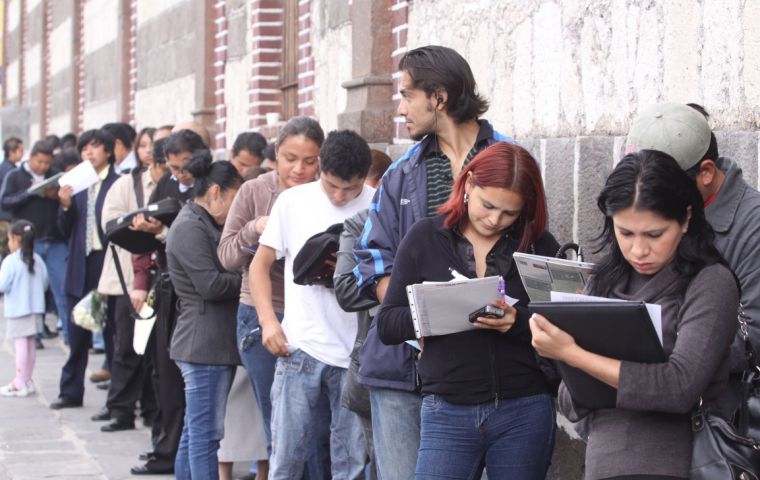MercoPress. South Atlantic News Agency
Almost two million Argentines out of a job in the second quarter of 2018
 The Indec data from 31 of the most important urban centers in Argentina, is an increase of 0.5 points from the previous quarter
The Indec data from 31 of the most important urban centers in Argentina, is an increase of 0.5 points from the previous quarter  The two sectors of the economy that produce the most jobs, manufacturing and domestic trade, registered falls in activity of 1.8% and 1.6% year-on-year.
The two sectors of the economy that produce the most jobs, manufacturing and domestic trade, registered falls in activity of 1.8% and 1.6% year-on-year.  Underemployment or people who seek to work more hours and do not find them, stood at 11.2% in the second quarter, 0.2% higher than the same period of 2017
Underemployment or people who seek to work more hours and do not find them, stood at 11.2% in the second quarter, 0.2% higher than the same period of 2017 Almost two million Argentines are without a job, more precisely 1,999,387 according to the latest unemployment report from the county's stats office, Indec. In effect unemployment rose in the second quarter to 9.6%, from 8.7% a year ago, making it the highest figure in twelve years.
The Indec data was drawn from 31 of the most important urban centers in Argentina, is an increase of 0.5 points from the previous quarter. In the six months of the year, jobless figures have now risen by 2.4%.
Indec admits that in year-on-year comparison “there is a statistically significant increase in unemployment and activity rates with respect to the second quarter of 2017.” The two sectors of the economy that produce the most jobs, manufacturing and domestic trade, registered falls in activity of 1.8% and 1.6% year-on-year.
Likewise underemployment, people who seek to work more hours and do not find them, stood at 11.2% in the second quarter, 0.2 percent higher than the figure from the same period of 2017.
The news comes follows on another piece of Indec data, which revealed last week that economic activity fell by more than four percent in the second quarter of the year, compared to the same period a year earlier. It was the steepest year-on-year decline since 2014.
The 4.2% contraction means Argentina’s GDP has shrank by 0.5% in the first half of the year and compared to the previous quarter, it slumped by 3.9%.
Argentina is currently experiencing a serious financial situation with soaring inflation and a sharp devaluation of the peso against the dollar (some 50% since the beginning of the year).
The business friendly government of president Mauricio Macri has warned of a “long and painful” recession. Nearly half of all Argentines foresee a “worse” economic future for their children, a new Pew Research Center study has found.
In its 2019 budget proposal, the government is predicting that the economy will shrink 2% in 2018 and 0.5% in 2019.
Meanwhile the Organization for Economic Cooperation and Development (OECD) warned that global trade tensions are leading to a rise in uncertainty that is hurting both advanced and emerging market economies. The report expressed particular concern about nations whose currencies have collapsed in recent months.
According to its projections, the OECD expects Argentina’s economy to contract 1.9% this year.




Top Comments
Disclaimer & comment rules-

-

-

Read all commentsReekio,
Sep 25th, 2018 - 05:56 pm +2“You ask me how come today's numbers are much worse than those in December 2015 when Macri took office?”
I don't ask you, but I can give you a good reason why there is a big difference - seasonal trends. If you check out https://tradingeconomics.com/argentina/unemployment-rate you will see that there is a pattern that the July figures (which is what the 9.6% figure is) have a strong tendency to be much worse than the January figures. So by comparing July 2018 with December 2015 you are comparing winter and summer figures which is NOT a valid comparison.
Also note the “the highest figure in twelve years”. Who was in power 12 years ago? Macri? No.
Here is some more Argentina July unemployment data for you for some historical perspective:
2003: 16.3%
2004: 14.8%
2005: 12.1%
2006: 10.4%
2007: 8.5%
2008: 8.0%
2009: 8.8%
Also, the “employment” of a large number of non-productive people will artificially and expensively reduce the unemployment rate.
9.6% isn't good, but I mentioned in a previous post (that you didn't respond to) that I know two people in Buenos Aires who were offered good jobs on the same day last week, which is statistically insignificant but maybe it is indicative that the September numbers will show an improvement? We shall see...
Reekio,
Sep 26th, 2018 - 05:48 pm +1I thought it was fairly obvious what I said we shall see. I do not have a crystal ball. I am simply saying that if the previous seasonal trends repeat this year then the unemployment rate will reduce from this July peak of 9.6%. I believe that we shall see the next quarter's unemployment rate when they are available and when that happens we shall see 1. if they are less than 9.6% (I expect that they will be, but maybe they won't be) and 2. how they compare to the same period last year (I have no idea).
I am not sufficiently thick to be able to predict uncertain events with the certainty that you do. Are you predicting that the unemployment figures for the next quarter will be greater than 9.6%? Or are you expecting them to improve too?
You didn't understand what I typed and responded with an ad hominem. You have no comment on the data but would prefer to stick with your unfair summer/winter comparison because it fits your opinion. Misrepresenting data and ad hominem attacks is not the way to argue for support for your opinions. Logically, you lose the argument by doing this.
And I reserve the right to wear thick pink glasses if I want to!
The worst in 12 years.
Sep 27th, 2018 - 10:21 pm +1Who reported unemployment numbers in the years 2010-2015?
The same INDEC which reported inflation of less than 10 per cent in the same period, so nobody knows the real unemployment percentage in the years before Macri took over.
Do remember that, according to the previous presidenta Cristina Kirchner, powerty in Argentina in 2015 was less than powerty in eg. Germany or Scandinavia - very reliable figures to people like Reekie who fled Argentina ages ago.
Commenting for this story is now closed.
If you have a Facebook account, become a fan and comment on our Facebook Page!